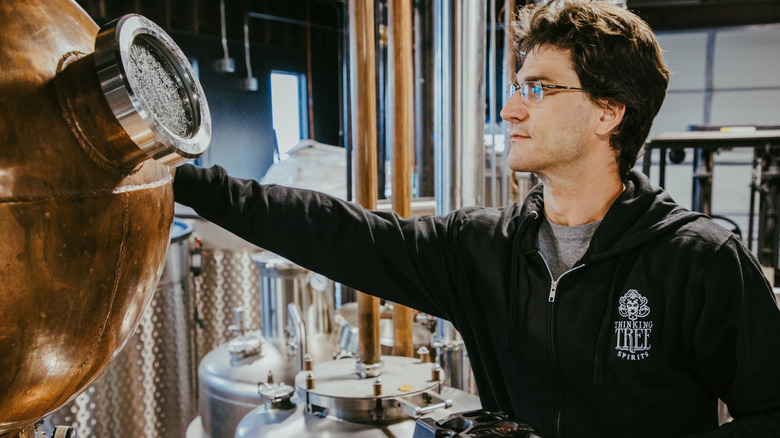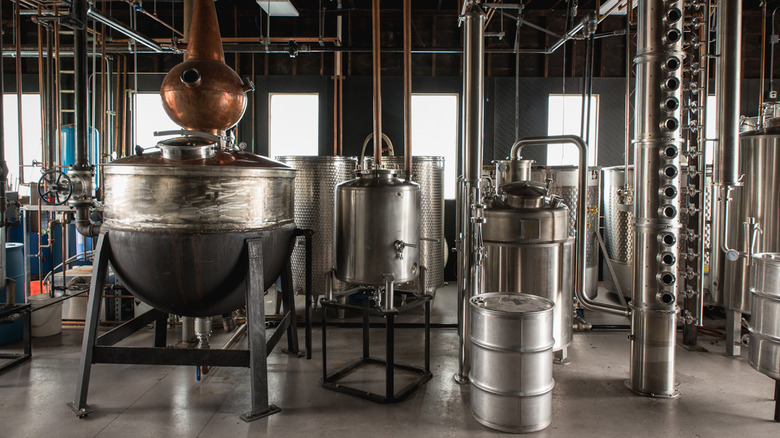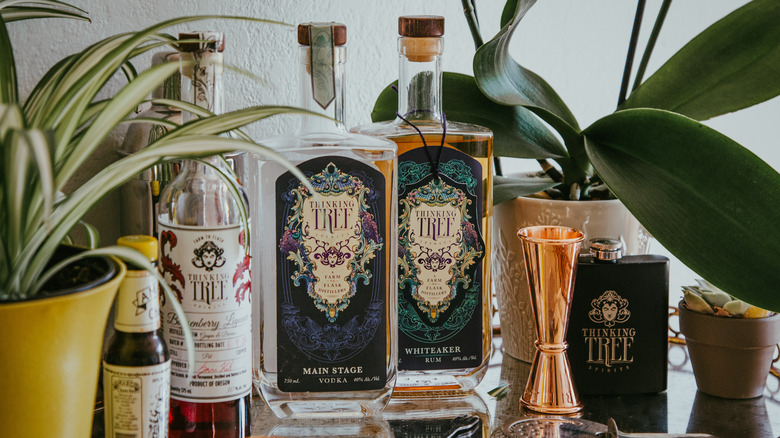This Oregon Company Takes A Unique Approach To Distilling Spirits
Distillation is the key step distinguishing spirits from beer and wine, according to Liquor, as the alcohol in fermented beverages is separated and condensed. Distilled drinks can be traced back to 800 B.C.E, notes Britannica, when grapes and honey were used to make brandy and mead. Stills are required for the process, a contained environment in which alcohol can be heated and collected — sometimes several times — before it's readied to be bottled and sold.
The first stills were essentially pots made from clay, and the alembic stills used in today's distilling processes have similar characteristics as those original vessels, per Deviant Distillery. As distilled beverages grew in popularity, the means of distilling drinks also evolved, cites VinePair. Coiled cooling tubes sped up the process, production costs began to lower, spirits could be more easily distilled, and larger enterprises capitalized on the opportunity to do business.
Fairly recently, craft-made spirits have gone through a type of resurgence, with smaller, independent enterprises setting out to make smaller batches of high-quality liquor (via 2nd Kitchen). One women-led distillery in Oregon is a prime example.
A conscientious approach to distilling
Thinking Tree Spirits was founded in Eugene, Oregon in 2014 by Emily and Bryan Jensen and distiller Kaylon McAlister. With sustainability in mind, the team decided to make their own stills using a repurposed jam and dairy tank with a fully-closed loop heating and cooling system in order to recycle energy throughout the distilling process. According to Sip Magazine, an old kombucha tank serves as a column still to make vodka and gin. Eugene Magazine describes the distillery's equipment as a "steampunk mad scientist's laboratory." Even the tasting room's bar has been made from wood from the original 95-year-old building.
CEO Emily Jensen told Eugene Weekly that 98% of the ingredients used to make the spirits are sourced within 45 miles of the distillery. Once they have those ingredients, "The fun part is controlling the distillation," McAlister told The Daily Emerald. By the time Thinking Tree's spirits are ready for the proofing stage, the alcohol has been filtered over 20 times, and the gin is brought to proof with water from Oregon's own McKenzie River, yielding what The Gin is In describes as a gin that is both adventurous and familiar with a lemongrass palate and notes of cucumber and juniper — perfect for sipping or mixing into cocktails.
And while the distillery takes pride in crafting spirits made from sustainable ingredients, the company is equally determined to give back to the community.
Local effort with impact
Chief Marketing Officer Darcey Morgan Howard told Tasting Table, "What it means for us to be 'community-powered' is more than just sourcing from local farms. It's a philosophy that actually creates opportunity." She references collaborations like Thinking Tree Spirits' Bee's Knees ready-to-drink bottled cocktail that is made with Glory Bee honey (a percentage of profits support the SAVE the BEE Initiative) and The Big Adventure, a collaboration with local electric vehicle company Arcimoto.
Thinking Tree's thoughtful efforts have been rewarded: the company was named Oregon Gin Distiller of the Year and received a Gold Medal in the New York International Spirits Competition (via Sip Magazine). Additionally, the office of the U.S. Vice President honored the company with the Governor's Rising Star Award for its noteworthy community contributions, including being the first distillery to produce and distribute hand sanitizer at the beginning of the Covid-19 pandemic.
So, the resourceful way Thinking Tree distills their spirits not only tastes good, but does good too.


